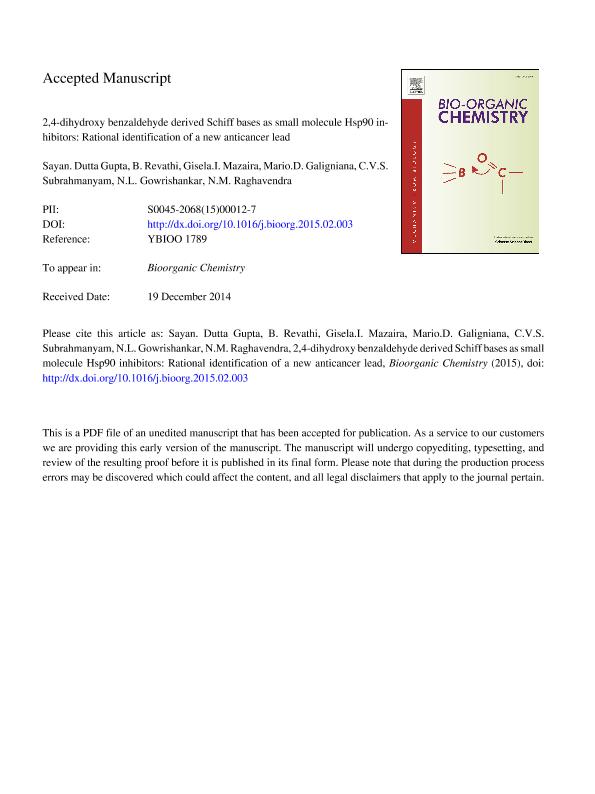Mostrar el registro sencillo del ítem
dc.contributor.author
Dutta Gupta, Sayan
dc.contributor.author
Revathi, B.
dc.contributor.author
Mazaira, Gisela Ileana

dc.contributor.author
Galigniana, Mario Daniel

dc.contributor.author
Subrahmanyam, C. V. S.
dc.contributor.author
Gowrishankar, N. L.
dc.contributor.author
Raghavendra, N. M.
dc.date.available
2017-08-24T17:58:25Z
dc.date.issued
2015-04
dc.identifier.citation
Dutta Gupta, Sayan; Revathi, B.; Mazaira, Gisela Ileana; Galigniana, Mario Daniel; Subrahmanyam, C. V. S.; et al.; 2,4-dihydroxy benzaldehyde derived Schiff bases as small molecule Hsp90 inhibitors: rational identification of a new anticancer lead; Elsevier Science; Bioorganic Chemistry; 59; 4-2015; 97-105
dc.identifier.issn
0045-2068
dc.identifier.uri
http://hdl.handle.net/11336/22934
dc.description.abstract
Hsp90 is a molecular chaperone that heals diverse array of biomolecules ranging from multiple oncogenic proteins to the ones responsible for development of resistance to chemotherapeutic agents. Moreover they are over-expressed in cancer cells as a complex with co-chaperones and under-expressed in normal cells as a single free entity. Hence inhibitors of Hsp90 will be more effective and selective in destroying cancer cells with minimum chances of acquiring resistance to them. In continuation of our goal to rationally develop effective small molecule azomethines against Hsp90, we designed few more compounds belonging to the class of 2,4-dihydroxy benzaldehyde derived imines (1-13) with our validated docking protocol. The molecules exhibiting good docking score were synthesized and their structures were confirmed by IR, (1)H NMR and mass spectral analysis. Subsequently, they were evaluated for their potential to suppress Hsp90 ATPase activity by Malachite green assay. The antiproliferative effect of the molecules were examined on PC3 prostate cancer cell lines by adopting 3-(4,5-dimethythiazol-2-yl)-2,5-diphenyl tetrazolium bromide (MTT) assay methodology. Finally, schiff base 13 emerged as the lead molecule for future design and development of Hsp90 inhibitors as anticancer agents.
dc.format
application/pdf
dc.language.iso
eng
dc.publisher
Elsevier Science

dc.rights
info:eu-repo/semantics/openAccess
dc.rights.uri
https://creativecommons.org/licenses/by-nc-nd/2.5/ar/
dc.subject
Anticancer
dc.subject
Docking
dc.subject
Hsp90
dc.subject
Mtt
dc.subject
Malachite Green
dc.subject.classification
Bioquímica y Biología Molecular

dc.subject.classification
Medicina Básica

dc.subject.classification
CIENCIAS MÉDICAS Y DE LA SALUD

dc.title
2,4-dihydroxy benzaldehyde derived Schiff bases as small molecule Hsp90 inhibitors: rational identification of a new anticancer lead
dc.type
info:eu-repo/semantics/article
dc.type
info:ar-repo/semantics/artículo
dc.type
info:eu-repo/semantics/publishedVersion
dc.date.updated
2017-08-08T14:29:16Z
dc.identifier.eissn
1090-2120
dc.journal.volume
59
dc.journal.pagination
97-105
dc.journal.pais
Países Bajos

dc.journal.ciudad
Amsterdam
dc.description.fil
Fil: Dutta Gupta, Sayan. Osmania University; India. Jawaharlal Nehru Technological University; India
dc.description.fil
Fil: Revathi, B.. Osmania University; India
dc.description.fil
Fil: Mazaira, Gisela Ileana. Universidad de Buenos Aires. Facultad de Ciencias Exactas y Naturales. Departamento de Química Biológica; Argentina. Consejo Nacional de Investigaciones Científicas y Técnicas; Argentina
dc.description.fil
Fil: Galigniana, Mario Daniel. Consejo Nacional de Investigaciones Científicas y Técnicas. Instituto de Biología y Medicina Experimental. Fundación de Instituto de Biología y Medicina Experimental. Instituto de Biología y Medicina Experimental; Argentina. Universidad de Buenos Aires. Facultad de Ciencias Exactas y Naturales. Departamento de Química Biológica; Argentina
dc.description.fil
Fil: Subrahmanyam, C. V. S.. Osmania University; India
dc.description.fil
Fil: Gowrishankar, N. L.. Swami Vivekananda Institute of Pharmaceutical Sciences; India
dc.description.fil
Fil: Raghavendra, N. M.. Osmania University; India
dc.journal.title
Bioorganic Chemistry

dc.relation.alternativeid
info:eu-repo/semantics/altIdentifier/url/http://www.sciencedirect.com/science/article/pii/S0045206815000127
dc.relation.alternativeid
info:eu-repo/semantics/altIdentifier/doi/http://dx.doi.org/ 10.1016/j.bioorg.2015.02.003
dc.relation.alternativeid
info:eu-repo/semantics/altIdentifier/pmid/25727264
Archivos asociados
